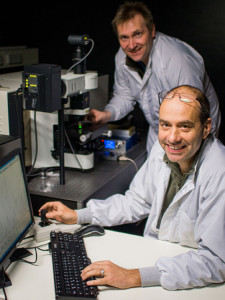DOE JGI is enabling collaborators to develop a universally applicable technique for studying microbial metabolic activities.
The Science:
A team led by University of Vienna researchers has developed a way to identify and sort single microbial cells through a probe-independent process that uses heavy water (laced with deuterium) which is then incorporated into mostly lipids of cells and then detected through Raman microspectroscopy.

ETOP project lead Michael Wagner of the University of Vienna (foreground) with colleague Markus Schmidt at the Raman microspectrometer. (Courtesy of M. Wagner)
The Impact:
The approach is part of a universally applicable process being developed to characterize the activities of individual single cells. This allows researchers to better understand the roles microbes play within their native ecosystems.
Summary
As part of the 10-Year Strategic Vision of the U.S. Department of Energy Joint Genome Institute (DOE JGI), a DOE Office of Science User Facility at Lawrence Berkeley National Laboratory, the Emerging Technologies Opportunity Program (ETOP) was launched to support new technology development at other institutions that once perfected, can then be deployed by the DOE JGI and its users to tackle energy and environment applications.
One of these ETOP projects involves characterizing individual microbial cells in situ by combining labeling with heavy water, Raman microspectroscopy, microfluidics and flow cytometry. Proposed by researchers at MIT and the University of Vienna, Austria, the technology could accelerate the functional characterization of genes from metagenomic sequencing experiments, one of DOE JGI’s highest priorities.
The early results of this ETOP project were described in the January 13, 2015 issue of the Proceedings of the National Academy of Sciences by a team led by University of Vienna researchers. Working toward a universally applicable technique that would allow researchers to evaluate microbial activities at the single cell level, the team conducted proof-of-principle experiments to study the efficacy of a process that involved incorporating heavy water (deuterium) isotopes into molecules, and then using Raman spectroscopy to chemically identify the microbes.
David Berry from the University of Vienna spoke about the ETOP project during the DOE JGI 2014 Genomics of Energy & Environment Meeting. Watch his presentation at http://bit.ly/JGIUM9_Berry.
Contact
Tanja Woyke
Microbial Program Head
DOE Joint Genome Institute
[email protected]
Funding
- U.S. Department of Energy Office of Science
- Austrian Science Fund
- Vienna Science and Technology Fund
- European Research Council
- Engineering and Physical Sciences Research Council
- Basic Science Research Program of the National Research Foundation of Korean
- Ministry of Science and Technology of China
Publication
- Berry D et al. Tracking heavy water (D2O) incorporation for identifying and sorting active microbial cells. Proc Natl Acad Sci U S A. 2015 Jan 13;112(2):E194-203. doi: 10.1073/pnas.1420406112.